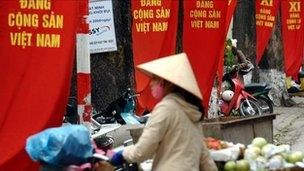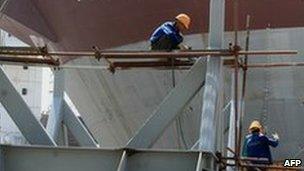Vietnam's Communist Party congress faces economic test
- Published

Vietnam's Communist Party holds a congress once every five years
Vietnam's Communist Party will select new leaders at its five-yearly congress opening this week - figures who must tackle rising economic challenges to a creaking socialist system.
The new leadership of the ruling, and only, party in Vietnam must negotiate a path for continued development of a country at an ideological crossroad.
Sweeping changes in direction are not expected, according to draft documents prepared for the party's 11th congress.
However, there are warnings that without a fresh approach to old fundamentals, the party not only risks intensifying domestic woes but also impeding Vietnam's ongoing integration into the international community.
Economic malaise
In 2010, the country registered a double-digit inflation rate, with a budget deficit well exceeding the government target despite increases in both foreign direct investment and overseas remittances.
One of Vietnam's largest state companies - the ship-building corporation Vinashin - also collapsed under a debt burden of $4.5bn (£2.9bn) last year.
The failure of Vinashin, dubbed Vinasink by many in Vietnam, has raised alarm about the dangers of a socialist doctrine that emphasises the state economy.

Many have blamed the state for the collapse of ship-building giant Vinashin
Some leading Vietnamese intellectuals have called the draft documents for the congress "out-of-date, not reflecting the current realities, and even backward".
One of them, Tran Phuong, who held the post of deputy prime minister from 1982-1986, called for a democratic society governed by the rule of law, where "the party should take responsibility if it makes mistakes".
Another leading economist, Dao Cong Tien, proposed getting rid of the old socialist formula, with its characteristics of overall control by the Communist Party and a nationalised planned economy.
Yet in the final draft of key documents to be read and discussed at the congress in Hanoi this week, the party insists on continuing to "develop a market economy with socialist orientation… where the state sector plays a decisive role".
Other mainstays, such as the threat from other countries and ideologies considered hostile, the need to maintain political stability and prevent political pluralism also remain.
It is widely expected that the documents will be swiftly passed by the 1,400-strong assembly.
This does not mean that the Vietnamese party elite are not aware of the lumps and bumps caused by the current economic malaise.
The government of Prime Minister Nguyen Tan Dung, who is also a member of the Politburo, has already been looking for ways to curb state-owned wildhorses and cut expenditure.
But the congress is meant to be a showcase of unity and consensus among party members, as this is the modus operandi of the Vietnamese Communist Party.
Factional struggle?
Furthermore, attention will be focused on personnel matters, with the selection of a new Central Committee who in turn will appoint a new Politburo, general secretary and two other internal commissions.
It is believed that the last plenum of the Central Committee held in December agreed to recommend Nguyen Phu Trong, currently Chairman of the National Assembly, to the top post of general secretary.
Mr Trong, 66, once served as the party's head theorist and is thought to belong to the conservative camp of the top hierarchy.
A leaked personnel proposal also suggested Nguyen Tan Dung will remain as prime minister, while Truong Tan Sang becomes the next president.
But some observers say that opinions remain divided on who is going to lead the party for the next five years and that factional struggle will continue well into the congress.
Only two days before the opening, a last-minute plenum of the Central Committee was called to "finalise the personnel proposal".
A few days before that, police in the central city of Hue were accused of mistreating an US diplomat when he attempted to visit a dissident Catholic priest. The US State Department promptly lodged a "strong protest" with the Vietnamese authorities.
The consequences of this diplomatic incident remain to be seen, but Father Nguyen Van Ly, the dissident priest involved in the case, speculates that the police might have acted on the orders of somebody who wished to undermine efforts by current leaders to develop ties with the former enemy.
Relationships with the United States and China have been important bargaining chips in the leadership selection process.
'No change'
Carlyle Thayer, a veteran Vietnam watcher in Australia, says it is possible there could be some surprises at the congress.
"It is clear that elected party delegates want a greater say in leadership selection than in the past," says Professor Thayer.
"They argue that if the principle of 'democratic centralism' is to have any meaning, they should be given a choice in the selection of party leaders."
In his opinion, although is unlikely that delegates will be able to directly elect the party secretary general, they are "likely to insist on some input".
Professor Tuong Lai, a prominent sociologist based in Ho Chi Minh City, says that "a breakthrough [in the selection process] would be a blessing for the nation".
The pool for selecting party leaders is limited as according to the rules, the candidate for the top post must have been a Politburo member for at least one term. Add an age limit of 65 years and there are not many candidates suitable for the position.
"The congress is only meaningful if it brings something new in the mechanism. We need new faces, new people," enthuses Professor Tuong Lai.
"But with the old system, I can't see how changes can occur."
- Published6 January 2011
- Published28 December 2010
- Published23 September 2010
- Published8 August 2010
- Published11 October 2010